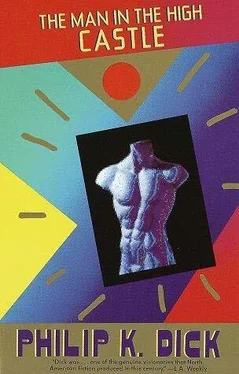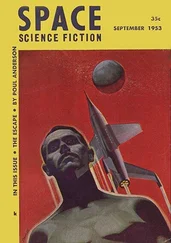Robert bowed slightly.
“The book,” Paul said, “which is quite rare, and which I possess a copy of nonetheless, is by Nathanael West. Title is Miss Lonelyhearts . I have read it with enjoyment, but do not totally grasp N. West’s meaning.” He looked hopefully at Robert.
Presently Robert Childan admitted. “I have never read that book, I fear.” Nor, he thought, even heard of it.
Disappointment showed in Paul’s expression. “Too bad. It is a tiny book. Tells about man who runs column in daily paper; receives heartache problems constantly, until evidently driven mad by pain and has delusion that he is J. Christ. Do you recall? Perhaps read long ago.”
“No,” Robert said.
“Gives strange view about suffering,” Paul said. “Insight of most original kind into meaning of pain for no reason, problem which all religions cope with. Religions such as Christian often declare must be sin to account for suffering. N. West seems to add more compelling view of this, over older notions. N. West possibly saw could be suffering without cause due to his being a Jew.”
Robert said. “If Germany and Japan had lost the war, the Jews would be running the world today. Through Moscow and Wall Street.”
The two Japanese, man and wife, seemed to shrink. They seemed to fade, grow cold, descend into themselves. The room itself grew cold. Robert Childan felt alone. Eating by himself, no longer in their company. What had he done now? What had they misunderstood? Stupid inability on their part to grasp alien tongue, the Western thought. Eluded them and so they took umbrage. What a tragedy, he thought as he continued eating. And yet—what could be done?
Former clarity—that of only a moment ago—had to be drawn on for all it was worth. Full extent not glimpsed until now. Robert Childan did not feel quite as badly as before, because the nonsensical dream had begun to lift from his mind. I showed up here with such anticipation, he recalled. Near-adolescent romantic haze befuddling me as I ascended stairs. But reality cannot be ignored; we must grow up.
And this is the straight dope, right here. These people are not exactly human. They don the dress but they’re like monkeys dolled up in the circus. They’re clever and can learn, but that is all .
Why do I cater to them? Due solely to their having won?
Big flaw in my character revealed through this encounter. But such is the way it goes. I have pathetic tendency to… well, shall we say, unerringly choose the easier of two evils. Like a cow catching sight of the trough; I gallop without premeditation.
What I’ve been doing is to go along with the exterior motions because it is safer; after all, these are the victors… they command. And I will go on doing it, I guess. Because why should I make myself unhappy? They read an American book and want me to explain it to them; they hope that I, a white man, can give them the answer. And I try? But in this case I can’t, although had I read it, I no doubt could.
“Perhaps one day I’ll have a look at that Miss Lonelyhearts book,” he said to Paul. “And then I can convey to you its significance.”
Paul nodded slightly.
“However, at present I am too busy with my work,” Robert said. “Later on, perhaps… I am sure it wouldn’t take me very long.”
“No,” Paul murmured. “Very short book.” Both he and Betty looked sad, Robert Childan thought. He wondered if they, too, sensed the unbridgeable gap between themselves and him. Hope so, he thought. They deserve to. A shame—just have to ferret out book’s message on their own.
He ate with more enjoyment.
No further friction marred the evening. When he left the Kasouras’ apartment at ten o’clock, Robert Childan still felt the sense of confidence which had overtaken him during the meal.
He meandered down the apartment house stairs with no genuine concern as to the occasional Japanese residents who, on their way to and from the communal baths, might notice him and stare. Out onto the dark evening sidewalk, then the hailing of a passing pedecab. And he was thereupon on his trip home.
I always wondered what it would be like to meet certain customers socially. Not so bad after all. And, he thought, this experience may well help me in my business.
It is therapeutic to meet these people who have intimidated you. And to discover what they are really like. Then the intimidation goes.
Thinking along those lines, he arrived at his own neighborhood and finally at his own door. He paid the chink pedecab driver and ascended the familiar stairs.
There, in his front room, sat a man he did not know. A white man wearing an overcoat, sitting on the couch reading the newspaper. As Robert Childan stood astonished in the doorway, the man put down his newspaper, leisurely rose, and reached into his breast pocket. He brought out a wallet and displayed it.
“Kempeitai.”
He was a pinoc . Employee of Sacramento and its State Police installed by the Japanese occupation authorities. Frightening!
“You’re R. Childan?”
“Yes, sir,” he said. His heart pounded.
“Recently,” the policeman said, consulting a clipboard of papers which he had taken from a briefcase on the couch, “you were paid a visit by a man, a white, describing himself as representing an officer of the Imperial Navy. Subsequent investigation showed that this was not so. No such officer existed. No such ship.” He eyed Childan.
“That’s correct,” Childan said.
“We have a report,” the policeman continued, “of a racket being conducted in the Bay Area. This fellow evidently was involved. Would you describe him?”
“Small, rather dark-skinned,” Childan began.
“Jewish?”
“Yes!” Childan said. “Now that I think about it. Although I overlooked it at the time.”
“Here’s a photo.” The Kempeitai man passed it to him.
“That’s him,” Childan said, experiencing recognition beyond any doubt. He was a little appalled by the Kempeitai’s power of detection. “How’d you find him? I didn’t report it, but I telephoned my jobber, Ray Calvin, and told him—”
The policeman waved him silent. “I have a paper for you to sign, and that’s all. You won’t have to appear in court; this is a legal formality that ends your involvement.” He handed Childan the paper, plus pen. “This states that you were approached by this man and that he tried to swindle you by misrepresenting himself and so forth. You read the paper.” The policeman rolled back his cuff and examined his watch as Robert Childan read the paper. “Is that substantially correct?”
It was—substantially. Robert Childan did not have time to give the paper thorough attention, and anyhow he was a little confused as to what had happened that day. But he knew that the man had misrepresented himself, and that some racket was involved; and, as the Kempeitai man had said, the fellow was a Jew. Robert Childan glanced at the name beneath the photo of the man. Frank Frink. Born Frank Fink. Yes, he certainly was a Jew. Anybody could tell, with a name like Fink. And he had changed it.
Childan signed the paper.
“Thanks,” the policeman said. He gathered up his things, tipped his hat, wished Childan good night, and departed. The whole business had taken only a moment.
I guess they got him, Childan thought. Whatever he was up to.
Great relief. They work fast, all right.
We live in a society of law and order, where Jews can’t pull their subtleties on the innocent. We’re protected.
I don’t know why I didn’t recognize the racial characteristics when I saw him. Evidently I’m easily deceived.
He decided, I’m simply not capable of deceit and that renders me helpless. Without law, I’d be at their mercy. He could have convinced me of anything. It’s a form of hypnosis. They can control an entire society.
Читать дальше










